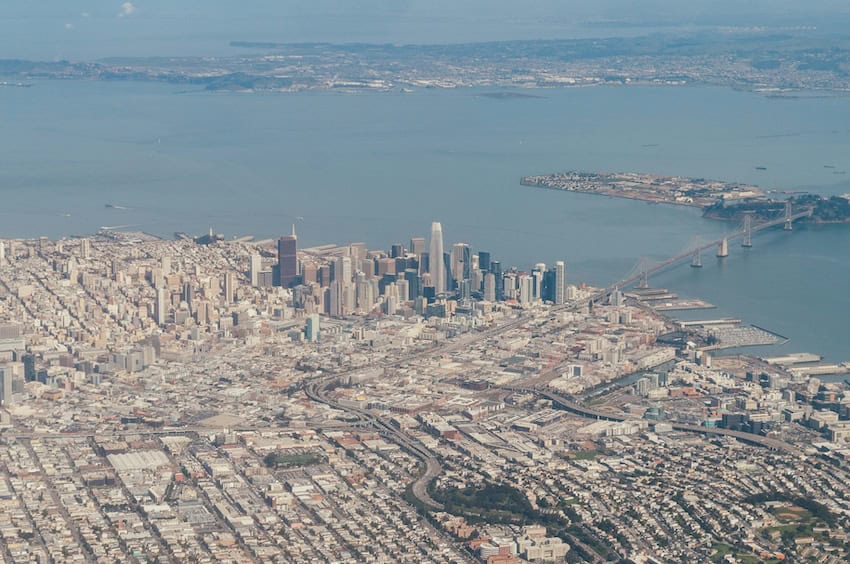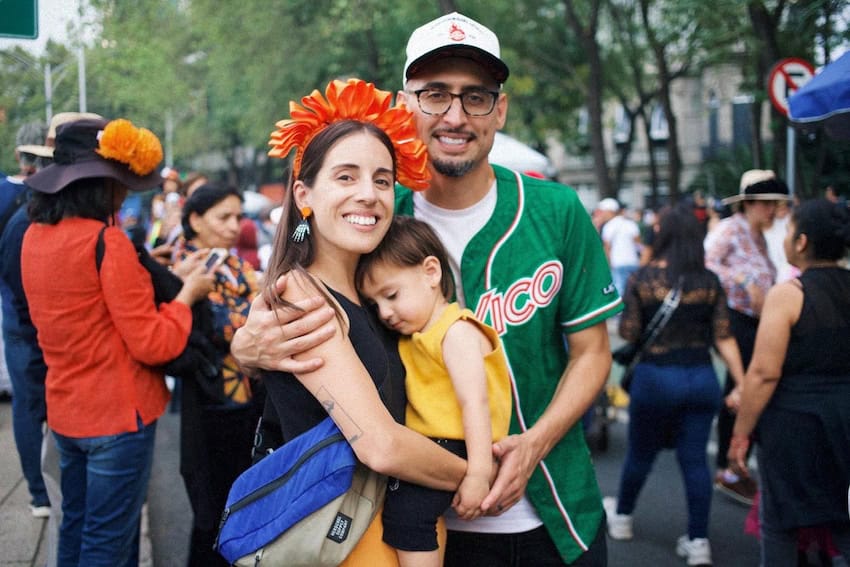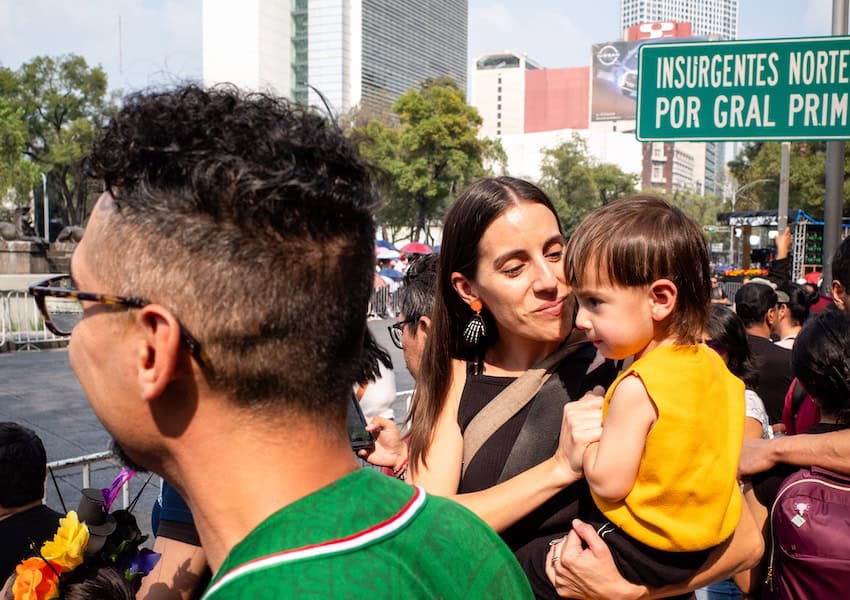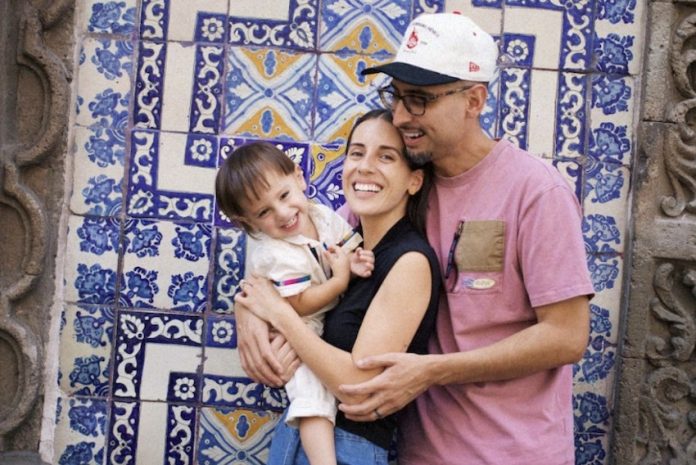Alan Chazaro made the bold decision to leave behind his vibrant network and life in the San Francisco Bay Area to embrace a quieter existence in Xalapa, Veracruz. For Alan and his family, the move wasn’t just a change of scenery — it was an intentional step toward grounding his young son in the linguistic, social, and cultural richness of Mexico.
Alan’s journey is the latest feature in MND’s “My American Dream is in Mexico” series, which spotlights the growing trend of Mexican-Americans reclaiming their heritage by choosing to live in Mexico. Each story delves into the motivations behind the move, the complexities of navigating dual identities, and the profound connections rediscovered in the country their parents once left behind.

Alan’s story weaves together themes of family, poetry, and the impacts of gentrification on a young family, offering a glimpse into what it means to make a home in Mexico.
Can you share your journey from discovering poetry to teaching, and what led you to writing full-time?
“Growing up in the San Francisco Bay Area, I was surrounded by diversity, hip-hop, and graffiti culture. As a teenager, I found my voice through rap and graffiti — spray-painting walls at night with my friends — because those were things my peers respected. Poetry, on the other hand, wasn’t something I could openly claim back then.
My journey into poetry was slow. It wasn’t until I sat in a classroom, away from my friends, that I started taking it seriously. Reading poets like Walt Whitman for the first time at 18 or 19 really drew me in. His sense of community, caring for others, and paying attention to the world resonated deeply. Poetry gave me a sense of value, confidence, and belonging — something I needed but didn’t realize was missing.

Later, I spent a decade teaching high school in high-need areas, from New Orleans to Boston. Many of my students had been expelled, faced homelessness, or spent time in jail. That work taught me so much — about appreciating what I have and about the resilience of young people who feel invisible, like I did growing up as a Latino boy with immigrant parents. It also deepened my belief in the importance of helping others feel seen and heard.
After 10 years, I was exhausted and needed a change. I applied to grad school for poetry at the University of San Francisco and received a fellowship, which meant I didn’t have to pay—an amazing privilege in the U.S. That’s when I transitioned from teaching to writing full-time. I channeled all the energy I’d spent on lesson plans and mentoring into my art, and that’s how I wrote my first two books.”
What role does identity play in your poetry and storytelling?
“I realized my upbringing was pretty unique. As a Latino, growing up without an everyday mother in my house was already transformative. Then, on top of that, being Mexican-American and growing up in the San Francisco Bay Area added its own layers. San Francisco is such an innovative and politically open place. I was going to protests as a teenager because that’s just the kind of environment San Francisco has always been — progressive and caring about others. That mindset naturally made its way into my poetry.
Being from the Bay Area is a big part of my identity — it’s number one for me. Then, being the son of immigrants comes next, and growing up in a single-parent household is another layer. As I started peeling back these parts of myself, I realized I didn’t know too many poets with my background or my path. Even the Latino poets I was reading were mostly traditional Chicanos from L.A., but that wasn’t me. I was a nerd from Silicon Valley who grew up watching Star Wars.
At the time, I hadn’t read a book that felt like it was written for someone like me. A lot of us feel that something needs to be said that hasn’t been said yet, and I thought maybe I could say it. That’s what drove my first books. I wanted to be the Bay Area Mexican-American millennial nerd I hadn’t seen in literature. My hope was that others like me — not exactly like me, but people who felt unseen — could find themselves in my work, or feel inspired to write their own stories after reading mine.”
What was the inspiration behind Notes from the Eastern Span, your 2021 book?
“I wrote my most recent poetry book from the perspective of the Bay Bridge, which connects Oakland and San Francisco. When I was growing up in San Francisco, the bridge was old and eventually torn down to make way for this new, shiny white bridge. To me, that bridge became a symbol of gentrification. It felt like a gut punch, and I think a lot of people from the Bay Area feel the same way.

Growing up in a place like San Francisco, you see so much change over time. People come in, driven by Tiktok, social media, and the ways the world works now, and gentrification pushes out people who’ve been there for generations. It’s painful to watch friends, family, and even students no longer able to afford to live where they grew up. There’s a sense of loss — not just of people, but of culture and connection.
This third book emerged from processing that sense of loss. The destruction and rebuilding of the bridge felt like a metaphor for the transformation of the Bay Area. The new bridge wasn’t built for people like my dad, a Mexican immigrant; it was for a new wave of tech industry arrivals who often lack the same history or deep connections to the community. Today, San Francisco is the most childless major city in the U.S. and likely one of the cities with the widest wealth gap among its residents”
How has your personal experience with gentrification influenced your decision to move to Mexico?
“My mom always told us to be proud of being Mexican and reminded us that we weren’t white. As I got older, that shaped my connection to Mexico. When it comes to gentrification, I feel like I was pushed out of where I grew up in California. So, I was careful about where I moved to in Mexico. I didn’t want to go to Mexico City, Guadalajara, or even San Miguel de Allende, which is beautiful but full of foreigners. I’m not against people moving, but I didn’t want to just live in a city, go to the cool restaurants, and feel disconnected.
That’s why I chose Xalapa. There aren’t many Americans here, and even my family makes fun of me for being the gringo, which I’m fine with. I wanted to be here because my family lives here — my mom and my abuela — and I wanted my son to grow up in a community. I didn’t want to be one of those expats moving to places like Cancun or Tulum. I’ve met people who move here without a connection to Mexico, and sometimes they act entitled, thinking they know more about the country than people who’ve lived here their whole lives. To me, that’s part of gentrification. I didn’t want to be in that group. I wanted to live a Mexican life in Mexico speaking Spanish.”
How does living in Veracruz compare to life in the Bay Area?
“My wife Briana and I first got a taste of Mexico in 2019 and returned to the Bay Area in 2020 when COVID hit, but living in Mexico was always in our hearts. We wanted to give our son, Maceo, a life that was rich and full of experiences because that’s something that we both created for ourselves. Mexico became the place where we could own a home and have the time to really be with him. In the Bay Area, you’re constantly driving, working long hours, stuck in traffic, and there’s little time or space for family.
People in the U.S. are addicted to work and the stress of it all, while in Mexico, there’s a much better family life balance. The U.S. is stressful and divided politically, and we felt that Mexico, with our family connections and our ability to speak Spanish, was the place where we could spend these early years with Maceo. It’s a huge privilege that we even have this choice, but Mexico allows for family life to take center stage in a way the U.S. doesn’t.”

How has your identity as a U.S.-born Mexican-American shaped your experience in Mexico?
“As I’ve grown older, I’ve come to see being Mexican-American as a “third culture.” I don’t pretend to be fully Mexican or gringo. There are Mexican-Americans who feel more connected to either side, but for me, it’s about embracing my unique blend of experiences — like the Bay Area hip-hop and fusion culture I grew up with. I’m proud of my Mexican heritage and have worked to connect with it, which is why I live in Mexico with my son. But I also don’t get offended when people here see me as gringo. I remind myself that I’ve had the privilege to experience more than many of my relatives who’ve never left home. As my wife says, it takes courage to leave what you know and walk in another world.”
What advice would you give to other Mexican-Americans considering a move to Mexico?
“My biggest advice is to spend time in the place you’re considering moving to and trust your intuition. As a writer, I’ve learned to listen to my gut, and moving to Mexico felt like a calling for me. Don’t let others’ doubts, like concerns about safety, distract you. Block out the noise and really listen to yourself. Moving here wasn’t easy — leaving my job, buying a home, and relocating my family — but I trusted that it was the right decision. And if things don’t work out, it’s okay to pivot.”
Rocio is based in Mexico City and is the creator of CDMX iykyk, a newsletter designed to keep expats, digital nomads and the Mexican diaspora in the loop. The biweekly dispatches feature top news, cultural highlights, upcoming CDMX events & local recommendations. For your dose of must-know news about Mexico, subscribe here.
